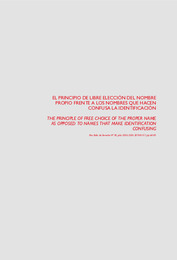Por favor, use este identificador para citar o enlazar este ítem:
https://hdl.handle.net/11000/37652Registro completo de metadatos
| Campo DC | Valor | Lengua/Idioma |
|---|---|---|
| dc.contributor.author | López Sánchez, Cristina | - |
| dc.contributor.other | Departamentos de la UMH::Ciencia Jurídica | es_ES |
| dc.date.accessioned | 2025-10-07T07:07:49Z | - |
| dc.date.available | 2025-10-07T07:07:49Z | - |
| dc.date.created | 2024-07 | - |
| dc.identifier.citation | Revista Boliviana de Derecho, No. 38, 2024 , págs. 60-83 | es_ES |
| dc.identifier.issn | 2070-8157 | - |
| dc.identifier.uri | https://hdl.handle.net/11000/37652 | - |
| dc.description.abstract | En el Derecho español, la Ley del Registro civil de 21 de julio de 2011 ha sido reformada por la Ley de 28 de febrero de 2023 para la igualdad real y efectiva de las personas trans y para la garantía de los derechos de las personas LGTBI, siendo una de sus consecuencias la abolición de otro límite en torno a la libertad de elección del nombre propio. En concreto, tras la citada reforma ha desaparecido la prohibición relativa a que el nombre haga confusa la identificación en relación con el sexo o la identidad sexual. Esta previsión se incluye con carácter general y sin hacer distinción alguna según se trate del momento del nacimiento o de un momento posterior, con los efectos que en ambos casos se derivan a la hora de llevar a cabo la identificación de las personas. | es_ES |
| dc.description.abstract | In Spanish law, the Civil Registry Act of 21 July 2011 was amended by the Act of 28 February 2023 for the real and effective equality of trans persons and for the guarantee of the rights of LGTBI persons, one of its consequences being the abolition of another limit on the freedom to choose one’s own name. Specifically, following the aforementioned reform, the prohibition on the name making identification confusing in relation to sex or sexual identity has disappeared. This provision is included in general terms and without making any distinction between the moment of birth and a later moment, with the effects that in both cases derive from the identification of persons. | es_ES |
| dc.format | application/pdf | es_ES |
| dc.format.extent | 24 | es_ES |
| dc.language.iso | spa | es_ES |
| dc.publisher | Instituto de Derecho Iberoamericano y Tirant lo Blanch | es_ES |
| dc.rights | info:eu-repo/semantics/openAccess | es_ES |
| dc.rights.uri | http://creativecommons.org/licenses/by-nc-nd/4.0/ | * |
| dc.subject | Nombre propio | es_ES |
| dc.subject | Registro Civil | es_ES |
| dc.subject | transexuales | es_ES |
| dc.subject | identificación | es_ES |
| dc.subject | sexo | es_ES |
| dc.subject | género | es_ES |
| dc.subject | Proper name | es_ES |
| dc.subject | Civil Registry | es_ES |
| dc.subject | transsexuals | es_ES |
| dc.subject | identification | es_ES |
| dc.subject | sex | es_ES |
| dc.subject | gender | es_ES |
| dc.subject.other | CDU::3 - Ciencias sociales | es_ES |
| dc.title | El principio de libre elección del nombre propio frente a los nombres que hacen confusa la identificación | es_ES |
| dc.title.alternative | The principle of free choice of the proper name as opposed to names that make identification confusing | es_ES |
| dc.type | info:eu-repo/semantics/article | es_ES |

Ver/Abrir:
Rev.Boliv. de Derecho julio 2024.pdf
342,83 kB
Adobe PDF
Compartir:
 La licencia se describe como: Atribución-NonComercial-NoDerivada 4.0 Internacional.
La licencia se describe como: Atribución-NonComercial-NoDerivada 4.0 Internacional.
.png)